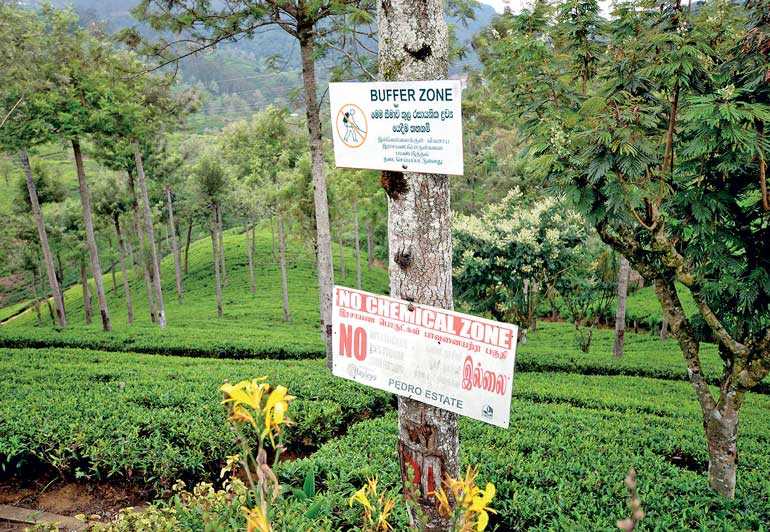Thursday Feb 26, 2026
Thursday Feb 26, 2026
Tuesday, 2 July 2019 00:00 - - {{hitsCtrl.values.hits}}

Leadership is a topic that has always been heavily focused on in Sri Lanka, especially in the political sphere. In the plantation industry, however, this has received less scrutiny over the years.
Last week in my ‘Beyond the Plants’ series, I delved into organisational culture in the sector to illustrate its effect on the overall industry’s status. However, after extensive research involving over 200 estate managers across plantations around the country, it is evident that organisational culture is directly connected to and influenced by different leadership styles of plantation sector leaders.
Understanding leadership
Based on an overview of the history of research in leadership, the concept can be broadly categorised into a number of important phases. Early studies on leadership (frequently categorised as “trait” studies on leadership) concentrated on identifying the personality traits which characterised successful leaders, as per Argyris and then Mahony later.
Trait theories assume that successful leaders are “born”, and that they have certain innate qualities which distinguish them from non-leaders, as documented by Ohio State University Professor Ralph Stogdill. However, the difficulty in categorising and validating these characteristics led to widespread criticism of this trait approach, signalling the emergence of “style” and “behavioural” approaches to leadership.
The principal conclusion of these studies is that leaders who adopt democratic or participative styles are more successful – something concluded by Seashore in 1966. In this sense, these studies were focusing on identifying the “one best way of leading”.
Leadership has also been defined by eminent scholars as the process of influencing others to understand and agree upon on what needs to be done and how to do it, and the process of facilitating individual and collective efforts to accomplish shared objectives.
The very act of defining leadership as a process suggests that leadership is not a characteristic or trait with which only a few or certain people are endowed with at birth. It further demonstrates that leadership is a transactional event that happens between leaders and their followers. Based on this, in both academic and professional spheres, we discuss three clear leadership types or styles;
Charismatic leadership
The history of charisma runs into many centuries. It was only limited to theological discussions until Weber borrowed it to discuss the rationalisation of Western society. According to Dr. J. Jayakody, Professor of Management and Finance at the University of Colombo, charisma, was originally referred to as a gift from the Holy Spirit and that it can be used to denote the superhuman, supernatural qualities and characteristics of a Holy Prophet.
As such, charisma is a certain quality of an individual personality by virtue of which he is considered extraordinary and treated as endowed with supernatural, superhuman, or at least specifically exceptional powers or qualities. These are such as not to be accessible to the ordinary person, but are regarded as of divine origin or as exemplary, and on the basis of them, the individual concerned is treated as a leader.
The concept of charisma is vaguely defined and has resulted in much confusion among neo-charismatic theorists about what was really meant by charisma and how one becomes or is perceived to be charismatic.
The new leadership theorists debate whether charisma is something that resides in the person, whether it is a type of relationship, an aspect of social exchange or an attribution phenomenon. It is important to understand this because of the effect it has on subordinates and employees, and so, it raises important questions about the type of leaders needed to ensure every entity and even the industry as a whole, is able to reverse its fortunes.
Transformational leadership
In an apparent return to the “one best way of leadership”, recent studies on leadership have contrasted “transactional” leadership with “transformational” leadership. Transactional leaders are said to be instrumental and frequently focus on exchange relationships with their subordinates.
In contrast, transformational leaders are argued to be visionary and enthusiastic, with an inherent ability to motivate their subordinates. Transformational leadership is also defined as behaviours of leaders that transform and inspire followers to perform beyond expectations whilst transcending self-interest for the good of the organisation.
Authentic leadership
Authenticity, as first referenced in management and organisational literature, viewed the authentic capacity of a leader as a litmus test of executive quality. With renewed interest in recent years on positive leadership, there has been scholarly focus on the development of the authentic leadership construct.
The core of authentic leadership extends beyond the authenticity of the leader as a person to encompass authentic relations with followers, as defined by Leadership and Executive Development consultant, Dr. Amara Emuwa.
This relationship is characterised by: (a) transparency, openness and trust; (b) guidance towards worthy objectives; and (c) an emphasis on follower development. Consequently, the behaviours of authentic leaders are reflected on the actions of followers and follower development.
Authentic leadership can also be defined as a pattern of transparent and ethical leader behaviour that encourages openness in sharing the information needed to make decisions whilst accepting inputs from followers.
Leadership styles and organisational culture
John Kuada, a professor from the Aalborg University in Denmark, in his research on African culture and leadership attributed “weak leadership” as the most important reason for the Sub-Sahara African (SSA) region’s disastrous economic growth compared to Asian economies such as South Korea and Malaysia which are in similar status of growth five decades ago.
Other contributory reasons cited by scholars are institutional and structural weaknesses, poor governance, management ineptitude and limited staff motivation. It is interesting to note the direct relationship of the above contributory reasons to leadership and as such, the impact that changes to leadership and organisational culture can create in the Sri Lankan plantation sector.
A cohort of studies on leadership theories in the 1980s suggest that culture provides a frame of reference or logic by which leadership behaviour can be understood. Similarly, in the Sri Lankan plantation sector, good leadership styles are argued to create a better organisational culture. In other words, good relationships amongst leaders and followers will lead to better organisational culture in the plantations, enabling them to achieve their desired goals.
Leadership styles in the plantation sector at present
Based on the findings of the quantitative analysis mentioned earlier on leadership styles; on an overall, the respondents perceived that they worked for good leaders. It was revealed that such a perception of high rating on leadership style was mainly due to the operational management skills displayed by the leaders on the existing business but not in the context of the strategic approach adopted.
As for organisational culture, there is a belief that the current organisational culture is better than what it was, i.e. comparing the current situation vs. the sector’s own past, rather than comparing the internal against the external environment. This could be attributed to the perceived uniqueness of the industry and lack of deep understanding of the actual pre-requisites required for organisational culture to be conducive for innovative practices.
In view of the high mean scores for all of the leadership styles – charismatic, transformational and authentic – it can be said that the respondents perceive they work for good leaders with a combination of different styles. This is in congruence with prior studies particularly in Sri Lanka where leaders are perceived to be the determinant of direction and sustainability of the industry.
Likewise, the study results were supportive of the high ratings managers gave their leaders. Three possible reasons have been identified for such high ratings.
First, the effective management of day-to-day operations and trouble shooting ability of leaders are believed by managers to help the plantation organisations to exist until today. Second, the limited exposure of estate managers outside the plantation sector makes them believe that their leaders are good and effective. Third, there are possibilities that the leaders do possess and display the desired leadership qualities, but due to constraints in the structure and culture of the plantation sector, such qualities cannot be effectively converted into business results.
Identification of these gaps will benefit the plantation sector to adopt a more relevant and current approach of leadership.
The connection between leadership style and organisational culture
Visionary and enthusiastic transformational leaders, with an inherent ability, motivate subordinates, and display their ability to obtain the involvement of employees, whilst ensuring the widespread agreement about the goals and clear strategy. Authentic and charismatic leadership styles have positive relationships with adoptability. Only the authentic leadership style displays a positive relationship with consistency, with the transformational leadership style having a positive relationship with mission.
These findings are due to the unique nature of the plantation sector and background of estate managers such as education level, the environment they operate in, types of initial training they receive at the commencement of their careers such as behavioural modelling against structured learning and the deeply-rooted systems, customs and traditions practiced within the estate environment as the statistical findings and interview results have demonstrated.
Having said so, however, some of the respondents explained during the interview the difficulties a leader may experience due to pressure from external forces such as trade unions. It is important to note that the authentic leadership style has a significant positive relationship with all of the four cultural traits of involvement, consistency, adaptability and mission.
Both the authentic and transformational leadership styles have positive relationships with involvement. Visionary and enthusiastic transformational leaders and charismatic leaders with exceptional type of relationship have the ability to obtain higher level of participation from team members. Authentic and charismatic leadership styles have a positive relationship with adaptability. Only the authentic leadership styles have a positive relationship with consistency and only the transformational leadership styles have a positive relationship with mission.
Again, the findings can be explained from the perspective of the context of the plantation sector and the background of deeply-rooted organisational culture which has been developed over the past century and a half through colonial rule.
Bringing innovativeness into the equation
As operational custodians, plantation leaders have a bigger and different role to play in applying innovative initiatives to resurrect the plantation sector. The results of this study reveal that with a combination of leadership styles, organisational culture and innovativeness, we can bring in “newness” to the plantation sector to adopt an organisation-wide reform rather than just incremental changes to the existing system.
We have to take into consideration the many studies conducting in this area of management, that highlight how leaders can help develop, shape and maintain a desired organisational culture that may in turn affect organisational innovativeness by creating new sets of shared values.
As such, next week I will endeavour to further reveal the challenges of the existing knowledge and beliefs of the plantation sector of Sri Lanka and elaborate the importance of being innovative on a regular basis and its inevitable ill effects of the failure to do so in the long run at the organisational as well as national level.
(Dr. Neil Bogahalande is a Director of State and private sector plantation companies with extensive experience at operational and strategic levels. He can be contacted on [email protected].)